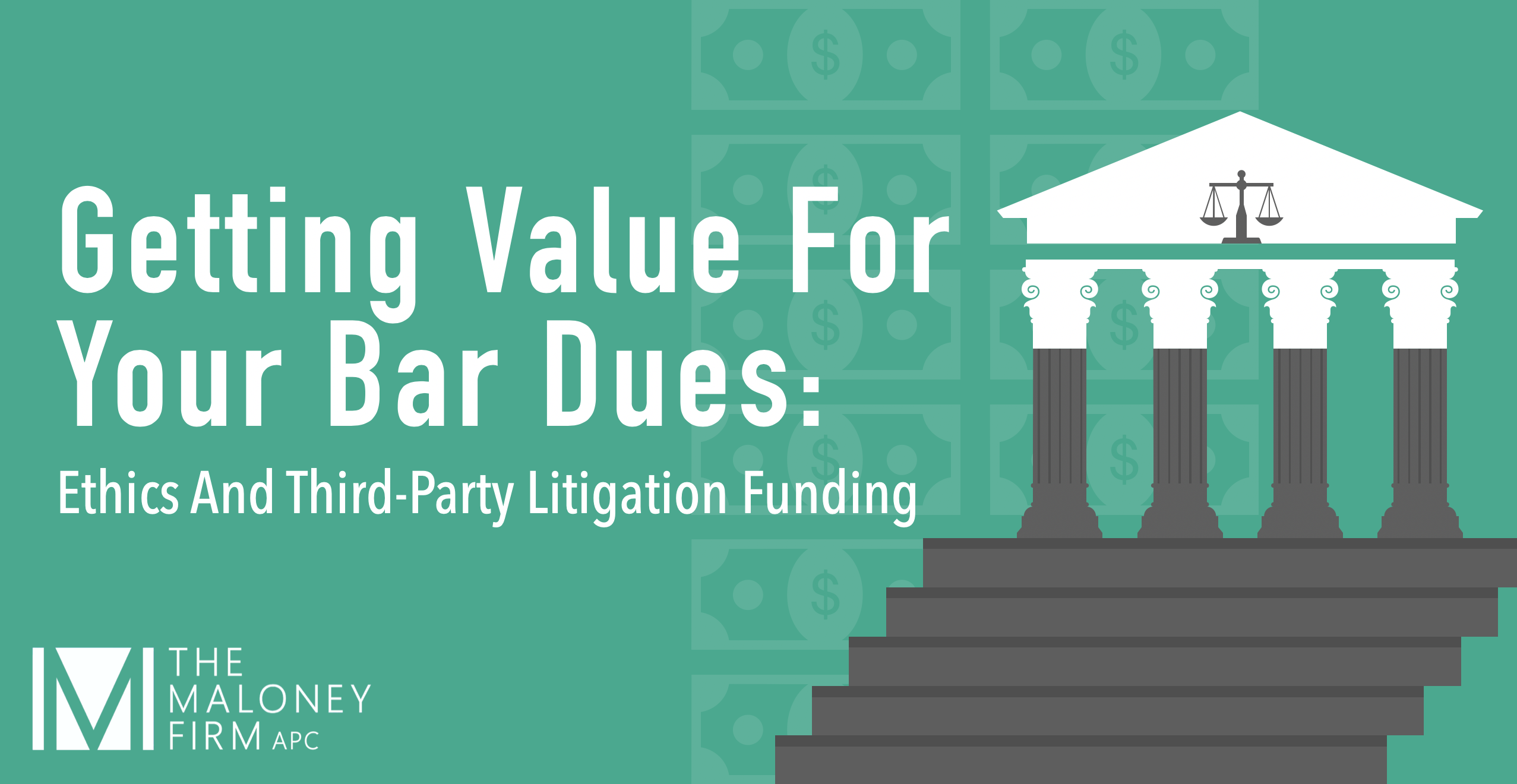Getting Value For Your Bar Dues: Ethics And Third-Party Litigation Funding
Oct 15, 2020By Carl I. S. Mueller, Esq., The Maloney Firm, APC

.
All California Attorneys Should Review The State Bar’s Ethical Opinion Providing Guidance On Third-Party Litigation Funding Before Considering Litigation Funding
.
The California State Bar’s Standing Committee on Professional Responsibility has issued Formal Opinion No. 2020-204 setting out the ethical considerations and disclosure requirements for attorneys whose clients are considering or utilizing third-party litigation funding. With litigation funders becoming more numerous and more creative in the funding structures offered, the committee’s opinion comes at an excellent time. Within the opinion, the committee points out the following issues and disclosures that attorneys must consider or make before utilizing third-party litigation funding:
.
- Duties of Competence and Communication: Pursuant to a lawyers’ duties of competence (Rule of Professional Conduct (“CRPC”) Rule 1.1(b)) and communication (CRPC 1.4(a)), an attorney must discuss whether third-party “litigation funding would assist in accomplishing the client’s goals. Such advice would likely need to include a discussion of the pros and cons of obtaining litigation funding and alternatives, if any.” To that end, in order to advise on a litigation funding contract, “the lawyer must understand how the terms of the funding agreement impact decisions in the litigation.”
.
- Duties of Independent Judgment and Loyalty: CRPC 2.1’s duty to provide “independent professional judgment” and the general duty of loyalty imposed on attorneys interplays with CRPC 1.7’s proscription on an attorney accepting representation “if there is a significant risk that the representation will be materially limited by the lawyer’s relationship with a third person” to limit some possible litigation funding arrangements. Furthermore, CRPC 1.8.6 requires specific disclosures and waivers before a lawyer can accept payment from a third person for the representation of a client. In combination, all of these rules require an attorney to take care when considering third-party litigation funding that requires any of the following: (1) payments made directly to law firms rather than to the clients; (2) rights of review or information sharing requirements with litigation funders; and (3) control over any aspect of the litigation by a third-party funder. While the committee did “not reach a general conclusion that any particular degree of control is per se unethical,” the opinion serves as a warning that such a possibility exists, and warnings and waivers as to the above are a minimum requirement for attorneys considering such an arrangement.
.
- Protecting Confidential Information: Importantly, attorneys must also consider CRPC 1.6, which bars an attorney from sharing confidential information without a client’s consent. To that end, it is paramount that attorneys seek and obtain a non-disclosure and confidentiality agreement with any third-party litigation funder before communicating any confidential information. Further, such an agreement may aid in protecting communications and work product from being discoverable. The committee cites Laguna Beach County Water Dist. v. Superior Court (2004) 124 Cal.App.4th 1453, 1459 for the proposition that such an agreement may shield work product shared with a litigation funder from discovery. However, as caselaw on these issues has not been developed to a point where a clear answer is known, an attorney must obtain informed consent from a client that such a waiver could occur before undertaking any sort of confidential communication with a third-party litigation funder or entering a litigation funding agreement.
.
Although attorneys are often justified in asking exactly what, if any, value they receive in exchange for their bar dues, in this instance, Formal Opinion No. 2020-204 gives California lawyers something useful. By following the guidance therein, attorneys should be able to more effectively craft the appropriate disclosures and conflict waivers for their clients that wish to utilize third-party litigation funding, allowing the attorneys to avoid the headaches and expense of malpractice and breach of fiduciary duty claims.
.
About the Author:
.
Carl Mueller is a business litigation attorney that represents clients in all phases of civil litigation. Mr. Mueller’s practice has a focus on attorney-client disputes of all kinds. If you have questions regarding this article contact Carl Mueller at cmueller@maloneyfirm.com.



